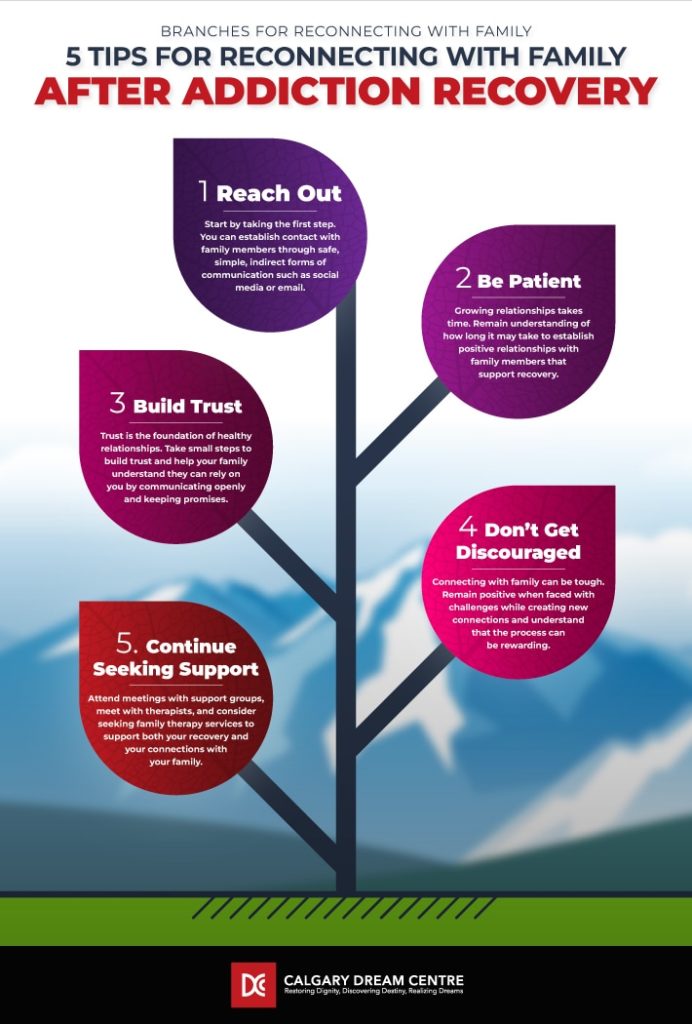One of the most challenging aspects of recovering from addiction can be reconnecting with family members. The role that families play in recovery can be important, so while it may be difficult, rebuilding those relationships can also be beneficial.
Reconnecting with family after addiction recovery takes time and is rooted in building trust. Building relationships won’t always be easy, but establishing connections with friends and family can be an important part of an individual’s recovery journey.
Understanding what to expect when you start trying to build new relationships with family and learning strategies to help support the growth of important relationships can make it easier to take the first steps toward connecting.
Understand that Reconnecting Is Possible
It’s important to recognize that the process of creating new, healthy relationships with family members can be difficult, but also that it is possible. Establishing healthy relationships can also help promote and support recovery.
One of the most common barriers to recovery from the effects of substance use is a lack of social support systems. Reconnecting with family can help provide social support for your overall wellness and mental health.
Make Sure You’re Ready
Not feeling ready is another common barrier to recovery from a substance use disorder. Reconnecting with family and friends after completing a treatment program can be stressful, and time spent discussing past conflicts may trigger feelings of guilt or shame that can present an additional barrier to recovery.
Making sure that you’re ready to speak with your family about both reconnecting in the present and the challenges both you and your family may have faced in the past can help to promote the growth of new, supportive relationships.

Reach Out
The first step can be the most difficult, but it’s also one of the most important. In many cases, when you are ready to connect with your family, you may need to be the person to reach out and establish contact.
Knowing how to reach out can be difficult too. Many people prefer to reach out through indirect methods of communication, such as social media or email, to give their family members an opportunity to process and understand their initial message.
Be Patient
Building healthy relationships takes time. Taking the initial steps to reach out and connect with family often doesn’t create immediate results. It will take time to establish supportive relationships.
Understanding that the process of creating new connections can take time and remaining patient as you establish new relationships with your family can help support the creation of a strong support system that promotes health and wellness.
Try to Understand Your Family’s Point of View
After you first reach out and throughout the process of reconnecting, try to understand that it may take some people longer than others to participate, accept, and engage with your intentions to connect.
Each person you connect with may be affected by substance use disorder differently. Thinking about your relationship with your family members from their point of view can help you communicate with them more clearly and effectively about your recovery and your desire to build strong relationships with them.
Be Prepared for People to Remain Upset
While many people can connect with their family and friends after recovering from substance use disorder, it’s important to remember that may not be the case for each person you communicate with.
It’s helpful to understand that connecting with everyone may not be possible. Try not to let that discourage any efforts to connect with other family members, friends, and individuals you may be able to rely on for support.
Build Trust
Conflicts with family members related to secrecy and fear can be created by substance use. Putting effort toward building trust in relationships with family members can help to reduce the effects of those conflicts and promote strong future relationships.
Building trust with friends and family members often starts with 2 simple principles: be honest and keep promises.

Be Open & Honest
Communicating openly about experiences with both substance use disorder and recovery can be difficult, but clear, honest communication is vital for creating strong bonds.
When communicating with family members, being clear about expectations and goals for future relationship growth helps everyone involved understand your reasons for wanting to connect and can help remove any doubts that may exist.
Some families find that seeking family therapy or a mediator who can help them communicate is a helpful way to communicate more openly and honestly during the early stages of reconnecting.
Make Promises & Keep Them
Building trust is easier when people know they can rely on each other. Making promises and following through with them helps people understand that they can rely on you, which can help build trust over time.
Promises don’t have to be huge, meaningful gestures. They can be simple, small gestures like promising to help clean up, cook dinner, or meet someone for a walk. The important part about making promises is keeping them so that people can understand you’re someone they can rely on and trust.
Don’t Get Discouraged
The ongoing process of connecting with family and friends during recovery can be tough, but with patience and effort, it can be rewarding. It’s vital to approach the process with continued effort—and try to remain positive.
As with any challenge, reaching your goals for connecting may take more time than you expect, and there may be unexpected difficulties. It can be easy to be discouraged, but remaining patient, honest, and positive can help you reach your goals.
Continue Seeking Support
Seeking continued support for physical and mental health is an important part of many people’s recovery process, especially during the maintenance stages that follow treatment programs.
Continuing to attend meetings with support groups and therapists is not only helpful for recovery but can also help provide additional support for creating new connections with family members.
At the Calgary Dream Centre, we help people at every stage of recovery with programs based on a nuanced, individualized approach that emphasizes empathy, compassion, respect, integrity, accountability, and innovation.
Contact us to learn more about how we can help.



